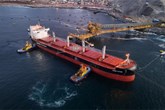North Sea Port records decline
Published by Oliver Kleinschmidt,
Deputy Editor
Dry Bulk,
Seaborne cargo transhipment at North Sea Port fell by 3.2% in the 1Q24 compared to the same period in 2023. The decrease was seen mainly in dry bulk throughput. Transhipment via inland waterways did experience growth.
Over the first three months of 2024, the North Sea Port companies recorded a cargo throughput volume of 16.4 million t. That was 500 000 t less than in the same period in 2023 (-3.2%).
Dry bulk down, liquid bulk up
Dry bulk handling declined by 6.4% (-0.6 million t), with falls seen in oilseeds, iron ore and scrap. Minerals and fertilisers did increase. However, it is worth noting that 2022 and 2023 had seen strong dry bulk figures, caused by the building of buffers as a result of the Ukraine war, among other factors. With this 'buffer urge' subsiding, volumes are back to pre-pandemic levels.
Liquid bulk did witness a turnaround: modest growth of 2.8% (+0.1 million t) in goods including chemicals and fertilisers.
General cargo handling remained at the same level (+1.6% or + 40,000 t).
In 2023, trade with Russia declined by a further 42% due to EU sanctions, falling by a further 18% in the 1Q24.
Growth in inland navigation
Cargo throughput via the inland waterways did show growth during the 1Q24: +3.9% (+0.6 million t), making a total of 15.9 million t. The increase was largely accounted for by liquid bulk (+8.3%, +0.6 million t). Dry bulk remained more or less steady (-1.1%, -0.1 million t).
Expectations
The 1Q24 is in line with the previous three quarters, in which cargo throughput increased each time. It is expected that this could continue for another two quarters, with a slight recovery towards the end of 2024.
Click here for free registration to Dry Bulk
Read the article online at: https://www.drybulkmagazine.com/ports-terminals/24042024/north-sea-port-records-decline/
You might also like
NYK Group operates methanol-fuelled bulk carrier for BHP
NYK Bulk & Projects Carriers Ltd has operated the methanol dual-fuel bulk carrier 'Green Future' using low-carbon methanol fuel, achieving an approximately 65% reduction in greenhouse gas compared to conventional fuel.

